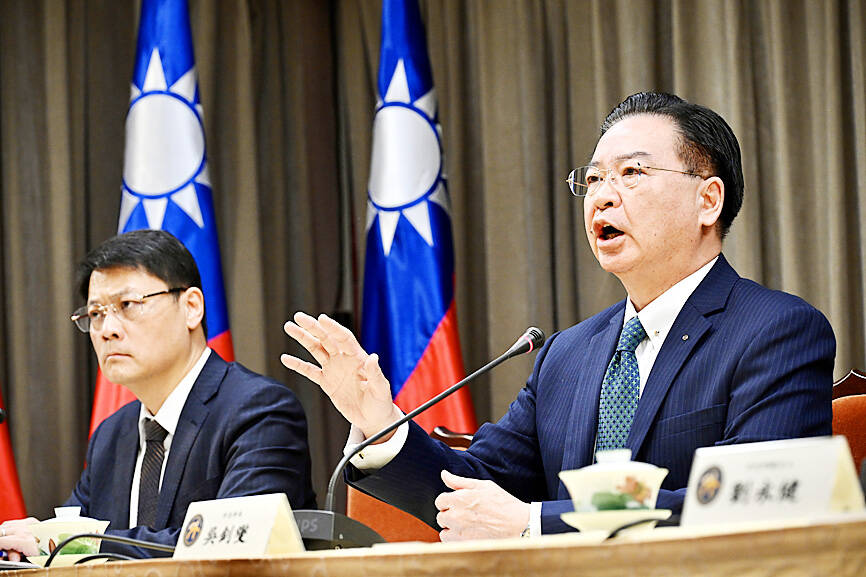Taiwan does not exclude the possibility of having formal diplomatic relations with countries that also have formal ties with China, regardless of Beijing’s stance, Minister of Foreign Affairs Joseph Wu (吳釗燮) said on Sunday.
There was speculation in 2012 that Honduras was attempting to have simultaneous diplomatic relations with Taiwan and China, an idea that then-minister of foreign affairs David Lin (林永樂) rejected.
Honduras severed formal ties with Taiwan on Sunday morning after establishing diplomatic relations with Beijing.

Photo: Lo Pei-de, Taipei Times
President Tsai Ing-wen’s (蔡英文) administration has taken a more practical approach to relations with like-minded countries since assuming government in 2016. Previous administrations took the position that the two sides could not “stand together” regarding their formal ties with other countries.
Taiwan is resisting China’s attempts to isolate the nation by becoming an important economic, cultural and technological partner of Latin American countries such as Argentina, Brazil, Chile and Mexico, in the fields of economics, culture and technology, Vice Minister of Foreign Affairs Alexander Yui (俞大?) told the Spanish-language online news outlet Infobae.
Taiwan would not ask other countries to sever diplomatic ties with China, but rather welcomes the idea of forming relations with both countries, Yui said.
Countries should consider whether Beijing’s Taiwan exclusion demand is reasonable, he added.
“We will not rule out any possibility,” Wu said when asked on Sunday whether the ministry encourages dual recognition.
If any country wants to bolster relations with Taiwan, whether in politics, diplomacy, culture or trade, Taipei would not consider their relations with Beijing as a factor, he said.
China’s suppression of Taiwan’s global participation “is not just toward a political party or certain people, but a problem for our country,” Wu said.
The government is working to expand Taiwan’s “breathing room” internationally, such as with a group of Czech lawmakers visiting Taiwan this week, he added.
Chinese Nationalist Party (KMT) Chairman Eric Chu (朱立倫) yesterday said Wu’s remark would result in more diplomatic losses, as accepting dual recognition “creates ambiguity.”

Chinese Nationalist Party (KMT) Chairman Eric Chu (朱立倫), spokeswoman Yang Chih-yu (楊智伃) and Legislator Hsieh Lung-chieh (謝龍介) would be summoned by police for questioning for leading an illegal assembly on Thursday evening last week, Minister of the Interior Liu Shyh-fang (劉世芳) said today. The three KMT officials led an assembly outside the Taipei City Prosecutors’ Office, a restricted area where public assembly is not allowed, protesting the questioning of several KMT staff and searches of KMT headquarters and offices in a recall petition forgery case. Chu, Yang and Hsieh are all suspected of contravening the Assembly and Parade Act (集會遊行法) by holding

PRAISE: Japanese visitor Takashi Kubota said the Taiwanese temple architecture images showcased in the AI Art Gallery were the most impressive displays he saw Taiwan does not have an official pavilion at the World Expo in Osaka, Japan, because of its diplomatic predicament, but the government-backed Tech World pavilion is drawing interest with its unique recreations of works by Taiwanese artists. The pavilion features an artificial intelligence (AI)-based art gallery showcasing works of famous Taiwanese artists from the Japanese colonial period using innovative technologies. Among its main simulated displays are Eastern gouache paintings by Chen Chin (陳進), Lin Yu-shan (林玉山) and Kuo Hsueh-hu (郭雪湖), who were the three young Taiwanese painters selected for the East Asian Painting exhibition in 1927. Gouache is a water-based

Taiwan would welcome the return of Honduras as a diplomatic ally if its next president decides to make such a move, Minister of Foreign Affairs Lin Chia-lung (林佳龍) said yesterday. “Of course, we would welcome Honduras if they want to restore diplomatic ties with Taiwan after their elections,” Lin said at a meeting of the legislature’s Foreign Affairs and National Defense Committee, when asked to comment on statements made by two of the three Honduran presidential candidates during the presidential campaign in the Central American country. Taiwan is paying close attention to the region as a whole in the wake of a

OFF-TARGET: More than 30,000 participants were expected to take part in the Games next month, but only 6,550 foreign and 19,400 Taiwanese athletes have registered Taipei city councilors yesterday blasted the organizers of next month’s World Masters Games over sudden timetable and venue changes, which they said have caused thousands of participants to back out of the international sporting event, among other organizational issues. They also cited visa delays and political interference by China as reasons many foreign athletes are requesting refunds for the event, to be held from May 17 to 30. Jointly organized by the Taipei and New Taipei City governments, the games have been rocked by numerous controversies since preparations began in 2020. Taipei City Councilor Lin Yen-feng (林延鳳) said yesterday that new measures by